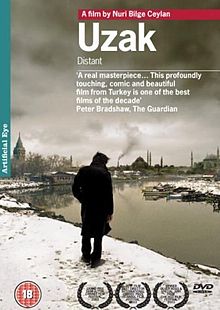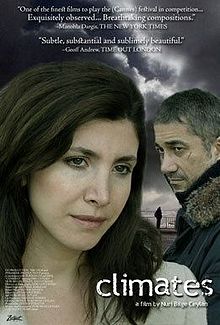 Turkish movie director Nuri Bilge Ceylan produced, wrote the screenplays for, and directed the movies Distant and Climates. Ceylan is very well-regarded internationally. Distant (2002) won the Grand Prix at the Cannes Film Festival, Climates (2006) won the Movie Critics’ Award at Cannes, Three Monkeys (2008) earned Ceylan the best director award at Cannes as well as made the shortlist for America’s Academy Award for Best Foreign Language Film, and Once Upon a Time In Anatolia (2011) once again won the Grand Prix at the Cannes Film Festival. In addition, Small Town won the Caligari Film Award at the Berlin Film Festival and the Silver Award at the Tokyo Film Festival and Climates won best picture at the SKIP City International Cinema Film Festival in Japan. In other words, nearly all of his works have received prestigious international awards. However, it is curious that none of his works have premiered in theatres in Japan.
Turkish movie director Nuri Bilge Ceylan produced, wrote the screenplays for, and directed the movies Distant and Climates. Ceylan is very well-regarded internationally. Distant (2002) won the Grand Prix at the Cannes Film Festival, Climates (2006) won the Movie Critics’ Award at Cannes, Three Monkeys (2008) earned Ceylan the best director award at Cannes as well as made the shortlist for America’s Academy Award for Best Foreign Language Film, and Once Upon a Time In Anatolia (2011) once again won the Grand Prix at the Cannes Film Festival. In addition, Small Town won the Caligari Film Award at the Berlin Film Festival and the Silver Award at the Tokyo Film Festival and Climates won best picture at the SKIP City International Cinema Film Festival in Japan. In other words, nearly all of his works have received prestigious international awards. However, it is curious that none of his works have premiered in theatres in Japan.
The distinguishing feature of Ceylan’s movies in a few words is his cinematography that is so beautiful, it’s terrifying. His cinematography is exhaustively calculated such that each frame in his movies could be a painting. Every moment is perfectly timed and positioned—a bird flying, a fly buzzing, a cat jumping out, a person entering. The color of the clouds, the shading on the mountain, the motion of the sea waves, the color balance of the buildings and roads, the effective use of mirrors, the paint peeling on the exterior of the train, the contrast in the colors of the red mast of a scrapped boat and the snow—all truly astonishing. He pays meticulous attention to lighting. He also delicately uses sound, inserting even noise effectively.
We can understand Ceylan’s obsession over images and sounds if we take a look at his resume. He studied electrical engineering in college and also worked part-time as a photographer to support his living. Before his success in cinema, he had a career as a photographer. He produced, wrote the screenplays for, and directed his own movies, but also supervised photography and sounds and did his own film editing. He is certainly a very technical person.
He also obsesses greatly over the acting. He had several actors perform the single scene of a man simply getting out of a car and talking to someone, ten times each. Even if he reshoots it fifty times, if he is not pleased with it in the end, he might mercilessly cut it out when editing. Snow scenes play a big role in both Distant and Climates. Since snow rarely falls in Istanbul, did he happen to just be lucky? Or did he wait patiently for it to snow?
When directing, he is quite micro-managing. For a seven second scene when the actress opens the door and enters her room, he interrupts for the smallest details that happen in one second—the way she tilts her neck or the way she purses her lips. He has his own clear image and he demands that the actors produce an image that is the same as his. Some actors may think it would be a little hard to work with him or that he is quite strict.
The theme of his movies is “inner world.” He is not a political artist at all, at least from his works that I’ve seen. However, having spent his youth in the 70s, a time of turbulence across the whole world, political disturbance was something that he could not avoid. In 1976, he entered Istanbul Technical University, but in those days, Turkey was in a period of political turbulence and the university didn’t function well; in 1977, the Taksim Square massacre occurred. The facts relating to this event aren’t made very public, but that day was the nation’s Labor Day and it is said that a rally gathering socialists and illegal communists was planned. Istanbul Technical University was the center of student movements and not an environment conducive to studying, so after that, Ceylan took an entrance exam and transferred to Boğaziçi University. He finished his military service and traveled around many places; in his mid-thirties, he decided to become a full-fledged person of the cinema.
 When I watch his early works Distant and Climates, I am made to think they might be an autobiography of his inner self. Depicted within these movies is a lonely man who is self-centered and unable to make a commitment to a woman or even himself. Both movies have a protagonist who is a good-looking man with a white-collar job. Women are drawn in by and attracted to such a man, but the man can’t commit to a serious relationship. He has a feeling that there are more interesting things in life than just dedicating himself to one woman so he rejects the woman. However, in the end, the man can’t find something that gives him satisfaction. He regrets parting with the woman, but he doesn’t have the passion to work hard enough to get the woman back.
When I watch his early works Distant and Climates, I am made to think they might be an autobiography of his inner self. Depicted within these movies is a lonely man who is self-centered and unable to make a commitment to a woman or even himself. Both movies have a protagonist who is a good-looking man with a white-collar job. Women are drawn in by and attracted to such a man, but the man can’t commit to a serious relationship. He has a feeling that there are more interesting things in life than just dedicating himself to one woman so he rejects the woman. However, in the end, the man can’t find something that gives him satisfaction. He regrets parting with the woman, but he doesn’t have the passion to work hard enough to get the woman back.
The loneliness of the protagonist also comes from the loneliness of the people living in the city of Istanbul. Many of the residents living in Istanbul are from rural areas and moved there seeking work. The sense of community of people helping each other in rural areas is lost in a big city like Istanbul, but they are not true city dwellers. The protagonist is a rootless person that wanders about the city.
The loneliness of the protagonist also seems to symbolize the loneliness of Turkey as a country.
The Ottomans, after overthrowing the Byzantine Empire in the 15th century, established their great empire that reached from Azerbaijan in the east to Morocco in the west and from Ukraine in the north to Yemen in the south. However, in the 19th century, signs of decline of the empire began to show and many races in various places ruled by the empire became independent one after another. Because of Turkey’s defeat in World War I and the occupation by countries such as Britain, France, Italy, and Greece, Turkey dissolved. Facing this crisis, patriotic Turks appealed for their nation’s independence and started an armed resistance movement. Under the preeminent leadership of Mustafa Kemel (Atatürk), Turkey was successfully reestablished as the Republic of Turkey in 1922 and the Turks were able to overcome the crisis of extinction.
Turkey chose secularism, separating religion and government, and tried to modernize. After World War II, Turkey, touching the south border of the Soviet Union and in conflict with Russia throughout history, was valued by the west as an anticommunist barrier during the Cold War. Turkey was again valued as a buffer zone between Islamic countries and Western countries when the conflict between America and Islamic countries intensified after the Cold War. Perhaps Turkey wants to be included in European countries. However, an anti-Turkey feeling still remains in Europe, viewing Turkey as a friend to Islam with their anti-Islam eye. From the perspective of Islamic countries, though, Turkey is a country that has abandoned Islam.
There is also conflict within Turkey. The majority of people in Turkey support the stance to separate religion and politics, but there are also many who wish to revive Islam. There are socialists as well as a strong influence from military authorities. It is a country of gentlemen carefully trying to not cause any international problems, but the internal balance is quite delicate.
Ceylan married Ebru Ceylan, an actress much younger than him who co-starred with him in Distant and Climates; they have a child together and Ceylan appears to be a settled family man. Climates is a tribute to his own child, but I assume there was a day of loneliness before he reached his peaceful state of mind. When watching these movies, the feeling that remains in me is a deep loneliness.
